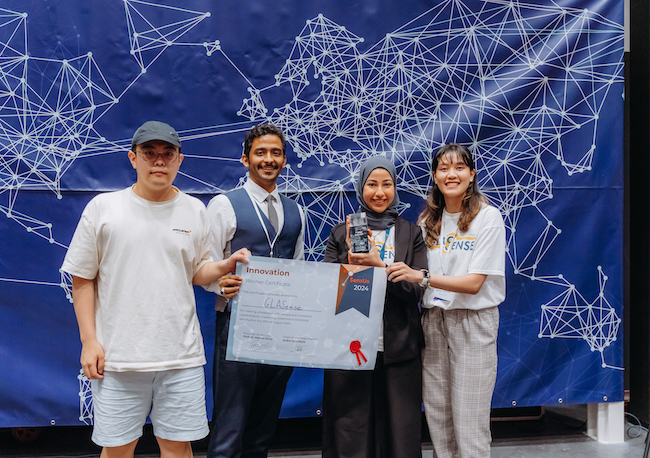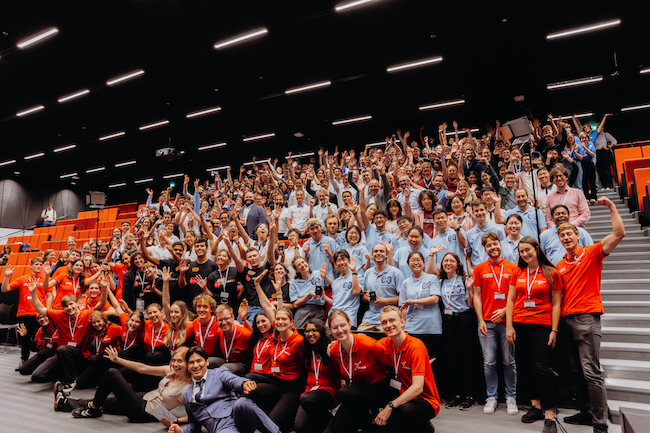Award success for multidisciplinary student team
Published: 17 September 2024
A multidisciplinary team of University of Glasgow students have picked up two prizes is the prestigious global SensUs competition.
A multidisciplinary team of University of Glasgow students have picked up two prizes in the prestigious global SensUs competition.
The 13-strong team, called GLAsense, won the Innovation Award and the Translation Potential Award for their design for a new biosensor capable of monitoring patients at risk of kidney failure.
The international SensUs competition, now in its 9th year, is organised and run by students from the Eindhoven University of Technology in the Netherlands. It aims to raise awareness of the benefits that biosensing can offer to patients and to healthcare in general, targeting a different area of healthcare each year.
This year’s competition, which was held on Thursday 29 August, saw 17 teams from Europe, Canada, China and the United States compete to develop cutting-edge biosensors to continuously measure patients’ levels of creatinine, a critical biomarker in acute kidney injury (AKI). AKI is a disease of the kidney that affects more than half a million patients in the UK.
GLASense united students from three of the University’s Colleges and the Glasgow School of Art to develop a wearable sensor which paired molecularly imprinted polymers with ultrasonic measuring techniques and microneedles for the first time.
Their groundbreaking design earned them the Innovation Award, while their clear pathway towards real-world application secured them the Translation Potential Award.

Four of the members of the GLAsense team (l-r) Zihao Pan, Farid Bahada, Tasneem Khodair, and Najaree Janjerdsak.
Tasneem Khodair, the team’s captain, said: "We're absolutely over the moon to have won both the Innovation and Translation Potential Awards! This recognition means so much to us because it shows that our design isn't just innovative, but it also has real potential to make a difference, particularly in Intensive Care Unit settings for kidney injury patients.
“We worked incredibly hard, and seeing all the other fantastic ideas from the other teams, we didn’t expect to win. We’re so proud of what we’ve accomplished together as a team. We will continue to work hard, with the great support from the university and our sponsors, to further develop our ideas into an impactful product in the near future. This is just the beginning of even more success ahead!"
The GLASense team was supervised by Professor Julien Reboud and Dr Chunxiao Hu of the James Watt School of Engineering, with support from Professor Jon Cooper and the School’s Technical Services team. Industry partners including Diagnostic Healthcare also offered their support.
Professor Reboud said: “I’m delighted that the team’s year of hard work has been rewarded with recognition in two of the SensUs competition’s four categories. These awards not only recognise the team's technical brilliance but also emphasise their commitment to developing practical solutions with the potential to make a significant impact in healthcare.
“GLAsense’s success underscores the University of Glasgow's commitment to innovation and practical solutions in healthcare, and we look forward to seeing their technology progress towards real-world implementation.”

The team’s success is the second time a team from the University has won an award in the competition. In 2018, the VanGow team picked up second prize in the Analytical Performance category of the competition.
The GLASense team are:
Farid Bahada – Biotechnology (MSc)
Hamna Khalid – Biomedical Engineering
Najaree Janjerdsak - Biomedical Engineering
Adi Karni - Biomedical Engineering
Tasneem Khodair – Mechatronics (Engineering)
Himaja Machiraju - Product Design Engineering (MSc) – Glasgow School of Art
Ally Nicolas – Film and TV/ Political Science
Zihao Pan – Electrical and Electronics Engineering (MSc)
Riddhi Papnai – Biotechnology (MSc)
Adam Peat – Product Design Engineering (MSc) – Glasgow School of Art
Pongnarit Plengsangsri – Biomedical Engineering
Olivia Skinner – Biomedical Engineering
Aleksandar Zahariev – Biomedical Engineering
First published: 17 September 2024

